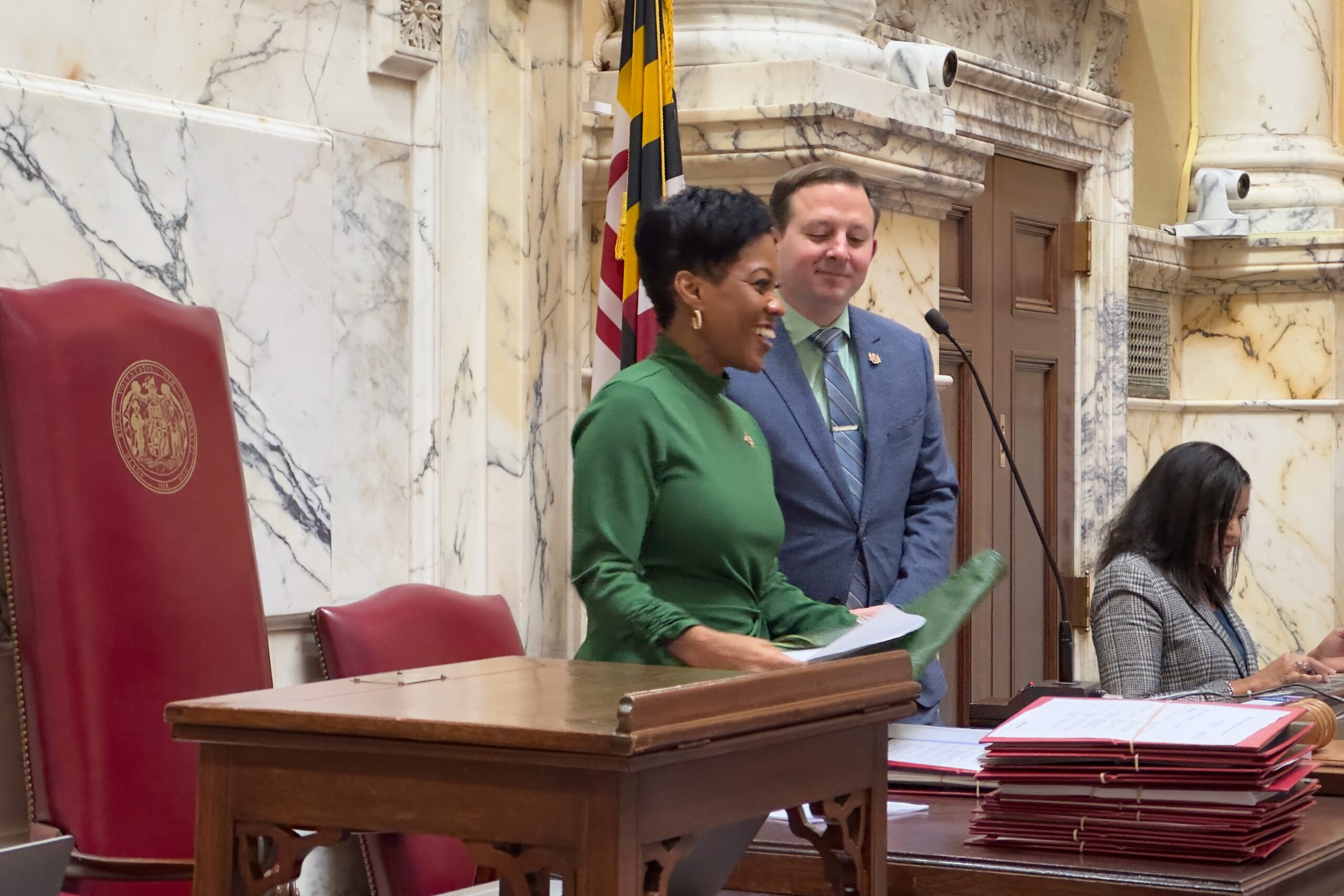Annapolis notes: Green bag appointments in, Susan Lee on leave, and Senate talks snakeheads

Gov. Wes Moore (D) is chipping away at a backlog of vacant appointments and expired terms on hundreds of state boards and commissions.
On Thursday, Appointments Secretary Tisha Edwards delivered 166 more names for 82 state boards and commissions that are part of the annual “Green Bag” process. The number is slightly more than half the number of appointments Moore sent to the Senate last year.
Edwards promised more in March.
According to figures released by the governor’s office, Moore has made 1,948 appointments in the last year.
There are about 5,201 positions designated as posts to be filled by the governor on more than 600 boards and commissions.
Moore entered office with 702 vacancies — about 17%, according to data released by the governor’s office. Since taking office, Moore has reduced the vacancy rate to 14%.
The administration is making headway in reducing the number of vacant board and commission seats and replacing appointments whose terms have expired.
Another 22% of those positions were held by persons whose terms had expired. Some members were 20 years beyond the end of their term.
The percentage with expired terms is now down to 20%, according to the governor’s office.
In comparison, the number of appointments Moore made is 60% more than the 1,217 his predecessor Gov. Larry Hogan (R) made. It is also more than twice that of Democratic former Gov. Martin O’Malley, who appointed 881 in his first year, according to the Moore administration.
Moore also provided data on increasing diversity on those boards and commissions.
Maryland’s population is 51% people of color and 49% white. State boards and commissions were not representative of the state’s demographics, according to the governor’s office.
In 2023, white appointees held 50% or more of the seats on 81% of state boards and commissions. Following appointments made in 2023 by Moore, the number of majority white panels decreased to 69%.
Another 25% — many of which were in rural counties — had no diversity at all. The governor’s office said that only 20% of those boards are now made up of only white appointees.
The number of women being appointed to boards and commissions is also increasing.
Last January, six in 10 boards and commissions were at least 50% men. The number of panels that are majority men is now 52%, according to the governor’s office.
Lee on leave
Maryland Secretary of State Susan C. Lee is out of the office on medical leave.
The Moore administration said Thursday that she temporarily turned over her duties a day earlier to Michael W. Lore, her deputy. The administration did not specify what medical treatment Lee is receiving or how long she will be away from her job, but officials characterized the situation as fairly short term.
In a statement provided to Maryland Matters, Lee said she was taking time off “to focus on a personal health matter.”

Deputy Secretary of State Michael W. Lore. Secretary of State photo.
“I expect to be back soon and appreciate privacy during this time,” Lee added.
Lee, 69, was the first Asian-American woman to serve in the Maryland General Assembly, appointed to a Montgomery County House seat in 2002. After a dozen years in the House, she was elected to the state Senate in 2014, where she served until becoming the Secretary of State last year.
Lore has worked with Lee as her top deputy since she entered the Senate in 2015. He also worked for the late state Sen. Norman Stone (D-Baltimore County) and for U.S. Rep. Jamie Raskin (D-8th) — both in Washington, D.C., and when Raskin was in the state Senate.
“I have been in touch with Secretary Lee and I am wishing her a speedy recovery,” Gov. Wes Moore (D) said in a statement. “While her presence and leadership will be missed, I am glad that she is prioritizing her health and look forward to welcoming her back to the office soon. I appreciate Deputy Secretary Lore, who has worked with Secretary Lee for many years, taking on additional duties in her absence.”
Eat more… Snakehead?
An invasive species of fish took another legislative step toward rebranding and, maybe, your dinner table.
The Maryland Senate Thursday voted 44-2 to approve SB 207, which renames the Northern Snakehead the Chesapeake Channa. The regional name is derived from the species scientific name, Channa Argus.
The idea behind the bill is to “encourage consumption of the snakehead to better manage its population in our waters by giving the snakehead a more appealing common name,” Bailey told a Senate Committee last month.
He described the fish, with its frightening countenance, as “delicious to eat.”
Initially, the common name proposed by Bailey was the “Patuxent Fish.” He nixed that after opponents mounted a petition drive, opposing linking the invasive fish from China to the environmentally sensitive Patuxent River. (The fish is native to east Asia, China, Russia, as well as North and South Korea.)
The interloping fish was first documented as a “reproducing population” in Maryland in a pond in Crofton in 2002. Back then, it gained the nickname “Frankenfish” because it can breathe air and survive on land for several days. The voracious predator has no natural enemies, consumes crustaceans and other fish, and could potentially outcompete species native to Maryland.
Sens. Johnny Mautz (R-Middle Shore) and Cory McCray (D-Baltimore City) voted against it.
McCray said he voted against the bill because “a constituent was concerned about Chesapeake being associated with the name.”
Constituents in Mautz’s district seem to prefer another name.
“We have a lot of them in my district, especially in Dorchester County,” said Mautz. “There, they call them Blackwater Bass.”
The largest Northern Snakehead caught in Maryland — 21-pounds — was caught in July 2023 in Dorchester County, according to the Department of Natural Resources.
Bailey’s bill now heads to the House, which on Thursday passed the identical HB 19 by a vote of 136-1.





 Creative Commons Attribution
Creative Commons Attribution